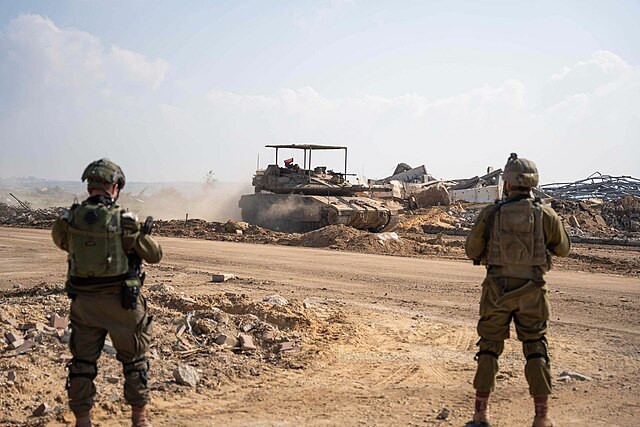Israel has issued new evacuation orders for residents in Gaza's southern city of Khan Younis, warning it would intensify its military operations in the area. This comes as part of a renewed offensive that has already displaced tens of thousands and caused significant casualties.
The Israel Defense Forces (IDF) announced on Monday that it would reduce the so-called humanitarian zone in the eastern part of Khan Younis, citing intelligence that the militant group Hamas had embedded itself in the area. "We are about to forcefully operate against the terrorist organizations and therefore call on the remaining population left in the southern neighborhoods of Khan Younis to temporarily evacuate to the adjusted Humanitarian Area in Al-Mawasi," the IDF stated on Telegram.
The ongoing conflict has seen relentless bombardment in Khan Younis, with a fresh Israeli ground assault earlier this week killing dozens of Palestinians. According to the United Nations, about 150,000 people fled Khan Younis on Monday alone, exacerbating the already critical shortages of food, water, and shelter.
An eyewitness in Khan Younis described the chaotic scene to CNN, stating she was "woken up by the screams" of people fleeing the area following the evacuation order. She reported hearing the sounds of clashes and explosions and seeing flares lighting up the night sky.
Despite the IDF designating Al-Mawasi as a humanitarian area, it has not been immune to attacks. A strike on July 14 reportedly killed 90 people and injured 300 more. The IDF justified the move as a response to "significant terrorist activity and rocket fire" from southern Khan Younis.
The conflict, which reignited on October 7 after a deadly Hamas attack on southern Israel, has resulted in staggering casualties. Israeli authorities reported that at least 1,200 people were killed and more than 250 abducted during the initial assault. Since then, Israeli military action in Gaza has killed over 39,090 Palestinians and injured another 90,147, according to Gaza's Ministry of Health.
Efforts to communicate the evacuation orders have been extensive. The IDF has been using SMS messages, recorded voice messages, phone calls, media broadcasts in Arabic, and flyers to inform residents. This is part of their strategy to mitigate harm to civilians, though aid agencies warn that these repeated evacuation orders complicate the delivery of emergency rations and essential supplies.
"People in Gaza are exhausted, living in inhumane conditions, with no safety at all," the UN Relief and Works Agency posted on X. The situation for the nearly 2 million displaced people in Gaza, almost the entire population, remains dire, with sanitation and medical facilities severely lacking.
In a related incident, an Israeli airstrike on a school in Deir Al-Balah, which was sheltering displaced people, resulted in at least 30 deaths. The IDF claimed the school was being used by Hamas as a command and control center. Gaza's Health Ministry reported additional casualties from other strikes on the same day.
The strikes came just ahead of scheduled negotiations involving U.S., Egyptian, Qatari, and Israeli officials to discuss a possible ceasefire and hostage deal. CIA Director Bill Burns and other international mediators are set to meet in Italy to advance these discussions.
Despite these diplomatic efforts, Israeli Prime Minister Benjamin Netanyahu has vowed to continue the offensive until achieving "total victory." This stance has drawn sharp criticism from Palestinian officials. Nabil Abu Rudeineh, spokesperson for Palestinian Authority President Mahmoud Abbas, condemned Netanyahu's speech to the U.S. Congress, arguing it gave a "green light" to further aggression.
The humanitarian crisis continues to deepen as Israel's military operations intensify. The UN and other aid agencies struggle to keep up with the growing needs of the displaced population, who face continuous displacement and diminishing safety zones.
The war's toll is staggering, with over 39,200 Palestinians killed and thousands more injured. The conflict began with a brutal assault by Hamas militants on October 7, which left 1,200 Israelis dead and about 250 hostages taken, many of whom remain in Gaza under dire conditions.
CNN and AP News contributed to this report.




